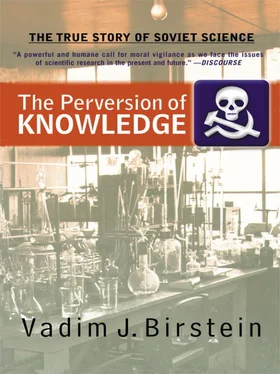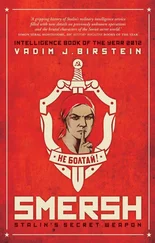Only recently has it become known that in the Soviet Union, as in Nazi Germany, humans were used for biomedical experiments—scientists who worked for the security service tested the action of poisons on human subjects. I first became aware of these experiments in 1990, while working as a volunteer researcher for the Moscow human rights organization Memorial . 10My specialty was foreign prisoners in the Gulag . 11That same year, as a Memorial representative, I was included as a member of the International Commission on the Fate and Whereabouts of Raoul Wallenberg, which was organized with the support of the Soviet Interior Ministry under Vadim Bakatin. 12
Memorial created an archive of materials on the history of political repression in the Soviet Union and on the victims of that repression. Some documents in this archive concern Grigory Mairanovsky, a Muscovite, biochemist, and doctor who was the head of Laboratory No. 1 within the Soviet state security system from the 1930s through the 1950s (see Table 1.1 for the chronological lineage of the security system: VCheKa; GPU [State Political Directorate]; OGPU [United State Political Directorate]; NKVD; MGB [USSR Ministry of State Security] and KGB [Committee of State Security]). The existence of this laboratory was a closely held Soviet state secret. Memorial’s historians and journalists published some information about this laboratory between 1990 and 1993 in the Moscow News 13and other newspapers. 14Also, State Prosecutor Vladimir Bobryonev and military journalist Valery Ryazentsev included documents on Mairanovsky and his NKVD-MGB supervisors from the still-closed KGB archives in the manuscript of their book The Ghosts of Varsonofyevsky Lane: Laboratory of Death—How the Soviet Secret Police Experimented on People and Poisoned Their Enemies, which was translated into English in 1996 but not published at that time. 15It has since been published in a shortened form in German. 16In addition, Bobryonev used the main events and real archival documents for his roman à clef, “Doctor Death,” or the Ghosts of Varsonofyevsky Lane, published in Russian. 17
In the case of Nazi Germany, literature on the involvement of bioscientists and doctors in experiments on humans is abundant. 18For instance, Benno Müller-Hill has analyzed this topic in detail in various articles 19and in his book Murderous Science. 20Until 1990, it was not widely known that at the same time the countries of the Axis, Nazi Germany, and Japan 21were conducting horrifying experiments on humans in concentration camps, the same testing was going on in the Allied camp, in the Soviet Union. The London murder of the Bulgarian dissident and writer Georgi Markov by means of a small poisoned bullet in October 1978 22was possible only because of the long history of NKVD-MGB-KGB poison research. Many details of these medical experiments are still secret.
During my research, I was saddened to read about experiments conducted by American doctors for the Central Intelligence Agency (the CIA, created in 1947) in the late 1940s–1950s. 23Of course, these experiments cannot be compared with those conducted by the Nazi doctors or Mairanovsky, but subjecting patients without their knowledge or consent to drug testing, electroshock treatment, and so on was a terrible breach of human rights. 24Two former members of the U.S. intelligence service, Victor Marchetti and John Marks, published a book about the whole issue, using knowledge they had obtained while working for the CIA and State Department Intelligence and Research Bureau. 25CIA officials were predictably outraged. The CIA director at the time, William Colby, wrote in his memoirs:
The outlines of their [Marchetti and Marks’s] book indicated that they intended to reveal and criticize a number of CIA’s activities, including those that CIA had undertaken with foreigners… Marchetti, Marks and their publisher… published the book with blank spaces showing the items we [the CIA] had initially identified as classified but then had withdrawn our objections. And they made a great publicity campaign out of our [the CIA’s] “censorship,” which certainly added to the book’s sale. 26
Despite the pressure from CIA officials, John Marks continued to collect material on unlawful experiments and finally published his analysis in The Search for the “Manchurian Candidate.” 27He revealed therein the terrifying American experiments during the Cold War using radioactive substances on volunteer convicts and servicemen, as well as on cancer patients, performed in connection with the Manhattan Project development of the A-bomb and H-bomb. 28The details were released through the work of the Advisory Committee on Human Radiation Experiments in 1994–1995. The committee was chaired by the bioethicist Ruth Faden, the daughter of Holocaust survivors.
Even more shocking for me was the recently released information about secret experiments of British military scientists from the 1940s to the 1960s. According to the press, more than 3,100 humans (volunteer military personnel) were exposed to the most dreadful nerve gases—sarin, tabun, and soman 29—at the Chemical and Biological Defence Establishment in Porton Down, Wiltshire. 30In a particularly large experiment conducted on 396 men in 1953, in which scientists sought to estimate how much nerve gas would kill a man through layers of clothing or on bare skin, a twenty-year-old airman named Ronald Maddison died. In 1999, the British police started to investigate this old case. It is alarming that a new gas chamber for tests of the next generation of nerve agents was built and opened at Porton Down in 1995, with a projected life of twenty years. 31Additionally, at least 100 air, sea, and land tests of germ-warfare-like substances were carried out in three regions of England in the 1960s–1970s. 32
I have presented material about Mairanovsky’s activities at two international meetings on bioethics. 33However, this volume is the result of much wider research. It shows that Mairanovsky’s experiments were possible only because of the security services’ involvement in Soviet science. The security service (commonly known as the KGB) was not separate from the Communist Party in the way that the CIA is from the American Congress. Quite to the contrary, it was proudly named “the Sword and Shield of the Party” and used a sword and a shield as its insignia. In many respects, a Soviet scientist’s career depended on Communist Party membership and a good relationship with the KGB. Secret service control was conducted at many levels. It began with demands to be “politically correct” in one’s support of Communist ideology and often involved coercion to inform on fellow scientists. The Academy of Sciences had, and still has, special secret departments headed by high-ranking state security officers. In addition, the secret service assigned acting and retired officers to work as scientists at the universities and research institutes. Sergei Muromtsev, Mairanovsky’s colleague in MGB secret experiments on humans, is a good example of the merger of MGB activity with Lysenkoism. As I will describe in Chapter 2, Muromtsev was one of Lysenko’s most enthusiastic supporters.
Unexpectedly, in recently declassified and published documents, 34the name of Mairanovsky’s superior, Pavel Sudoplatov, one of the most ruthless NKVD/MGB executioners, appeared not only with Mairanovsky’s but also in connection with the case against the famous geneticist Nikolai Vavilov, who was arrested by the NKVD in 1940. Sudoplatov was called in at the end of his case, in 1942, when Vavilov was dying of dystrophy in prison after having been tortured during the long NKVD “investigation.” It remains unknown what the NKVD wanted to use the geneticist for.
I am personally convinced that Mairanovsky served as an inspiration to Stalin for the “killer-doctor” image he successfully exploited in the famous Doctors’ Plot case—a part of Stalin’s sophisticated plan to depose powerful members of the inner circle of the Politburo 35by employing anti-Semitic hysteria. The official anti-Semitic campaign against the “Cosmopolitans,” the term used to refer to Jews in the Soviet mass media at the time, started in 1947 and intensified after the MGB-staged murder of a famous actor and head of the Jewish Anti-Fascist Committee, Solomon Mikhoels, in January 1948. 36It culminated in 1951–1952 with the MGB-created Doctors’ Plot case, which was personally directed by Stalin.
Читать дальше











